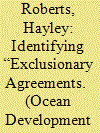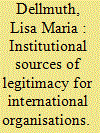| Srl | Item |
| 1 |
ID:
178352


|
|
|
|
|
| Summary/Abstract |
The United Nations Convention on the Law of the Sea (UNCLOS) is heralded as a constitution for the oceans and, as part of this, provides for a compulsory dispute settlement procedure entailing binding decisions. However, case law and academic commentary have highlighted significant issues in definitively identifying other agreements that could preclude these compulsory procedures—a concept permitted by the Convention in certain circumstances. This article begins to explore this challenge by contending that the type of agreement plays a significant role in whether or not it could be determined to be an “exclusionary agreement.” In doing so, the article conducts a systematic interpretation of Articles 281 and 282 UNCLOS, underpinned by the application of relevant provisions in the Vienna Convention on the Law of Treaties. This provides a conclusive basis as to whether the status of an agreement as an “ad hoc agreement” (specific; adopted for the dispute) or an “existing agreement” (general; adopted prior to the dispute) holds any significance in the context of these articles.
|
|
|
|
|
|
|
|
|
|
|
|
|
|
|
|
| 2 |
ID:
168868


|
|
|
|
|
| Summary/Abstract |
This article addresses a significant gap in the literature on legitimacy in global governance, exploring whether, in what ways, and to what extent institutional qualities of international organisations (IOs) matter for popular legitimacy beliefs towards these bodies. The study assesses the causal significance of procedure and performance as sources of legitimacy, unpacks these dimensions into specific institutional qualities, and offers a comparative analysis across IOs in three issue areas of global governance. Theoretically, the article disaggregates institutional sources of legitimacy to consider democratic, technocratic, and fair qualities of procedure and performance. Empirically, it examines the effects of these institutional qualities through a population-based survey experiment in four countries in different world regions with respect to IOs in economic, security, and climate governance. The findings demonstrate that both procedure- and performance-related aspects of IO policymaking matter for popular legitimacy beliefs. This result holds across democratic, technocratic, and fair qualities of IO procedure and performance. Disaggregating the results by issue area indicates that a broader scope of institutional qualities are important for legitimacy beliefs in economic governance compared to security governance and, especially, climate governance. These findings suggest that propositions to reduce the institutional sources of IO legitimacy to single specific qualities would be misguided.
|
|
|
|
|
|
|
|
|
|
|
|
|
|
|
|